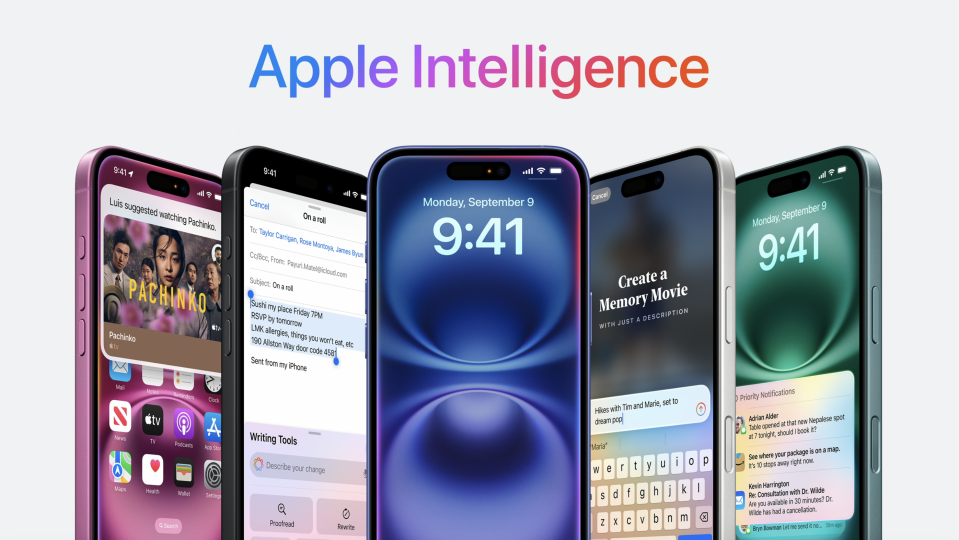Apple’s iPhone 16 line hits store shelves on Sept. 20, and while the new phones get some impressive hardware upgrades, their biggest selling point isn’t the Pros’ larger displays or the lineup’s Camera Control button. It’s the generative AI-powered Apple Intelligence software platform.
And while Apple Intelligence won’t launch alongside the new phones — it’ll begin to roll out as a software update for US English users in October — it’s clear that Apple (AAPL) is throwing all of its weight behind the technology as the catalyst to reaccelerate iPhone sales, which have flagged in recent quarters.
Apple CEO Tim Cook pointed to the iPhone 16 lineup as the first built “from the ground up” for Apple Intelligence. Wall Street is similarly banking on Apple Intelligence pushing users to upgrade from their older iPhones, with analysts including Morgan Stanley’s Erik Woodring and Wedbush’s Dan Ives saying the platform is key to future iPhone growth.
While the iPhone 16 may benefit from the inclusion of Apple Intelligence, the company is clearly positioning the platform as its software of the future, something it will build on for years to come.
“This is a long-term play for Apple,” Nabila Popal, senior research director at IDC, wrote in a note following Apple’s iPhone 16 launch event on Sept. 9. “And while we may not see the bigger impact immediately, Apple Intelligence will eventually change the smartphone user experience completely, like with the first iPhone.”
A slow roll
During the show’s keynote, Apple hit on a number of Apple Intelligence features it says will be coming to iPhones next month. Those include product updates the company showed off during its WWDC event in June, such as generative AI-powered summarizations for text notifications and emails; writing tools to help proofread, punch up, and summarize documents; photo editing; and the ability to record and transcribe notes and phone calls.
It’s an early look at how Apple is thinking of AI and where it thinks it will benefit consumers the most. We’ve seen similar capabilities from Google and Samsung, but Apple was sure to point out that its first crop of AI offerings are just the beginning of a larger rollout, which will include a reimagined, more capable version of Siri.
The goal is to ensure consumers don’t get their hands on the first few AI apps and shrug their shoulders at their limited functionality. After all, the tech industry has promised that generative AI will revolutionize virtually every gadget and piece of software. And if consumers’ first experiences with the technology underwhelms, it could sour their view on Apple’s AI plans.
After all, remember what happened when Apple released its Apple Maps app in 2012 before it was ready for prime time? Users derided its look, and it took years for the software to gain traction.
Positioning Apple Intelligence’s initial set of features as the first in a series of software updates for iPhone owners gives Apple the latitude to deliver portions of its AI platform piecemeal, ensuring that even if users are put off by early interactions with the software, the company will be able to correct those issues and have more capabilities to market in the future.
Launching new features in the future would also give Apple cover if any of the first batch of Apple Intelligence offerings run into hiccups like the kind Google experienced when it rolled out AI Overviews and had to pull it back after it told people to add glue to their pizza.
Outside of that, slowly launching Apple Intelligence products should keep users from feeling overwhelmed with so many new features at once, which could similarly confuse and turn them off from the experience.
Apple still has to deliver
While launching Apple Intelligence over time will help Apple better control its rollout, the company still has to deliver on its already lofty expectations. And while it may not blow people away at the start, the company is setting up Apple Intelligence to be quite an impressive collection of features.
Siri, in particular, looks like it will finally become the smart assistant we were promised years ago, complete with the ability to understand what’s on your screen and the option to not only speak your requests but type them out as well.
“I don’t think Siri is a new interface that will change how we interact with the world around us — yet,” Forrester VP and principal analyst Thomas Husson said in a statement. “However, there are clear signs that Siri is finally moving into becoming more of a digital agent leveraging on-device information and personal context to deliver new multimodal experiences and take actions on the user’s behalf.”
Apple also showed off its new visual intelligence feature, which it says will use the iPhone 16’s new Camera Control functionality to provide information about the world around you similar to Google’s Circle to Search. Point your camera at a restaurant using visual intelligence and it will pull up ratings and hours; see a pair of shoes you like and point your camera at them to find purchasing options online.
While Apple is playing it safe on its rollout strategy, it’s clear it has bigger ideas in the hopper that could dramatically alter the way we use our phones. The company just has to deliver on those plans.
Email Daniel Howley at dhowley@yahoofinance.com. Follow him on Twitter at @DanielHowley.
Click here for the latest technology news that will impact the stock market
Read the latest financial and business news from Yahoo Finance
EMEA Tribune is not involved in this news article, it is taken from our partners and or from the News Agencies. Copyright and Credit go to the News Agencies, email news@emeatribune.com Follow our WhatsApp verified Channel





